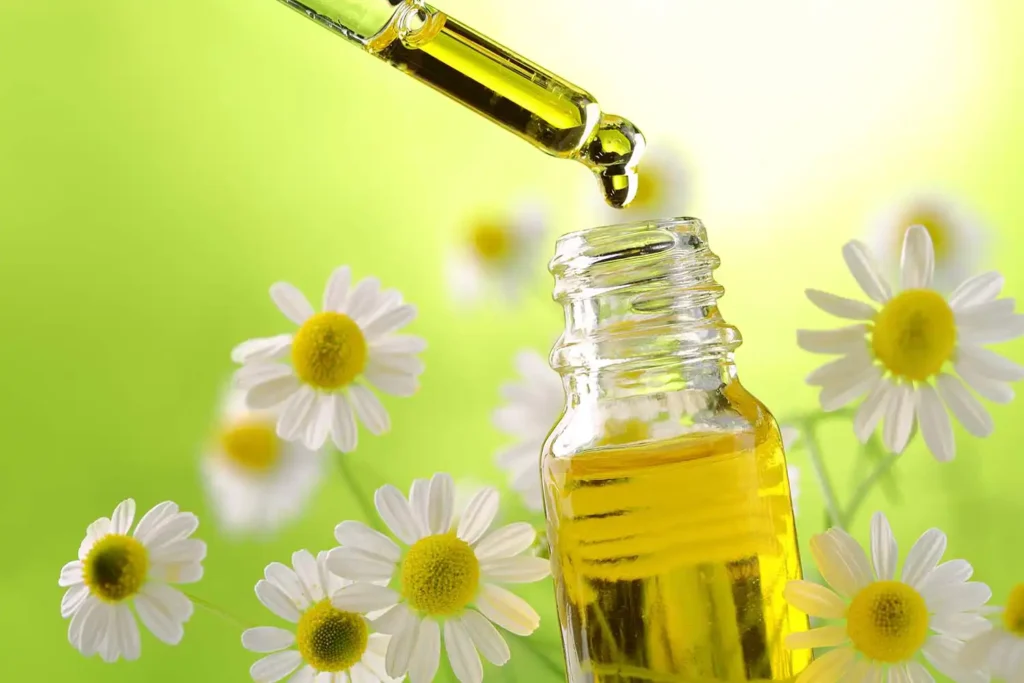Aromatherapy To The Rescue!
Stress and anxiety have become increasingly prevalent issues in modern life. According to the American Psychological Association, nearly 8 in 10 Americans report feeling stressed on a regular basis. Chronic stress harms physical and mental health, causing problems such as hypertension, insomnia, and depression. Many people find it challenging to manage stress and anxiety due to their busy lives.
One holistic approach that has grown in popularity for stress relief is aromatherapy. Aromatherapy utilises concentrated extracts from plants known as essential oils to provide therapeutic benefits and promote wellness. Research shows that aromatherapy can help alleviate symptoms of anxiety and improve quality of life and stress levels. Other researched health claims include improved sleep quality, enhanced mood, and decreased diastolic blood pressure.
This article will explore how aromatherapy and essential oils can be used as natural remedies to ease anxiety and tension. We will look at how smells affect the brain, talk about the top essential oils for reducing stress, and give tips on using them safely for relaxation.
What is Aromatherapy?
Aromatherapy is a healing technique that uses fragrant essential oils from plants to improve overall physical, mental, and emotional well-being. The chemical compounds in essential oils often have anti-inflammatory properties and other therapeutic effects. When you inhale essential oils, they have specific benefits, which can also be obtained by applying diluted essential oils topically.
The Science Behind Scent and Emotion
Aromatherapy’s effectiveness stems from the strong connection between our sense of smell and the brain. Inhaling essential oil molecules sends signals to the olfactory and limbic systems in the brain. These systems have the ability to process emotions and memories. This causes both physiological and psychological changes in the body and mind.
Scientists believe that our remarkable capacity to recall scents enables essential oils to induce distinct emotions and mental states, such as relaxation or revitalisation. Studies show scent can influence heart rate, hypertension, breathing, stress hormones, and brain wave activity.
Benefits of Aromatherapy for Stress & Anxiety
Using essential oils provides a drug-free and non-invasive way to manage stress, anxiety, and related issues. Benefits include:
Alleviating feelings of stress and tension
Lessening symptoms of anxiety and depression
Improving sleep quality
Boosting mood and promoting feelings of calmness
Regulating hormones and bodily processes tied to stress
Enhancing concentration and mental clarity
Aromatherapy is considered a complementary therapy and has shown promising results scientifically and anecdotally. It’s an accessible and flexible way to support mental health and encourage overall wellness.
Understanding Stress & Anxiety
To understand how aromatherapy helps relieve stress, let’s first look closely at the causes and effects of stress and anxiety.
What Triggers Stress and Anxiety?
Potential triggers include:
Work pressure and job uncertainty
Financial or health problems
Major life changes or traumatic events
Relationship conflicts
Perfectionist tendencies and self-criticism
Perceived lack of control over situations
Overscheduling and feelings of being overwhelmed
Our thoughts and emotions can also trigger stress. Anxiety disorders involve persistent and excessive worry not tied to actual events.
How The Body Responds to Stress
When we perceive a real or imagined threat, the nervous system activates the “fight-or-flight” response. This triggers a cascade of physical changes, including:
Fight, flight, or freeze response
Increased heart rate and blood pressure
Tense muscles
Hyperventilation or breathlessness
Sweating and chills
Heightened senses for awareness and reaction
The long-term effects of chronic stress
Prolonged activation of the stress response takes a toll on nearly every system in the body. The effects of chronic stress include:
Impaired immune system functioning
Digestive issues like constipation or diarrhoea
Disruption of reproductive cycles
Increased risk for heart disease, diabetes, obesity
Anxiety, depression, and other mental health issues
Trouble sleeping and fatigue
Loss of motivation, focus and productivity
Aromatherapy oils can help counteract these detrimental effects by activating our body’s relaxation response.

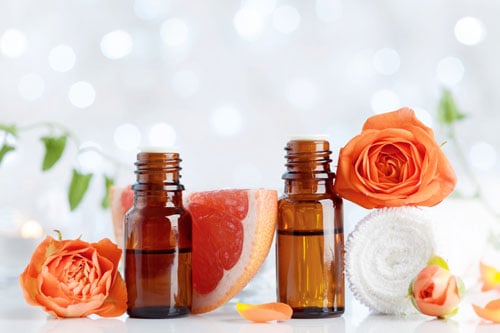
Our Top 10 Picks of Aromatherapy Oils for Stress & Anxiety Relief
There are hundreds to choose from, so knowing what essential oils are good for stress can be hard. Here are 10 of the best essential oils for relieving stress anxiety, and boosting your mood.
Lavender Essential Oil
Origins and properties
Originating from the Mediterranean and the Middle East, there are over 400 varieties that are now grown worldwide. Lavender essential oil is steam-distilled from the flowering tops of the lavender plant. Lavender essential oil has a fresh, floral, herbaceous scent. It is versatile and widely used, providing various health benefits. Lavender essential oils vary greatly depending on where and even the altitude they are grown. When grown above 1500 meters, the plant produces more esters, producing a fruity aroma in its essential oil. This makes it even more effective at reducing anxiety.
How to use Lavender for relaxation
Lavender is excellent for reducing tension, anxiety, and restless sleep. Use Lavender oil to help you relax before bedtime. You can use Lavender oil in different ways. You can diffuse it, add a few drops to a warm bath with carrier oil, or apply diluted oil to your wrists, neck, and temples.
Chamomile Oil
Origins and properties
Chamomile is native to Europe but is grown in many more places, such as India. The Ancient Egyptians used it, becoming a staple in many cultures. Chamomile oil has four variations: Roman, German, Blue and Cape. Roman Chamomile essential oil is the most popular due to its attractive aroma and calming and anti-inflammatory benefits. The blue colour is from Azulene, which is a strong anti-inflammatory agent.
Chamomile’s calming effects
Chamomile essential oil has been used for centuries as a natural remedy for anxiety and sleep issues. It contains compounds that relieve muscle spasms, tension, and discomfort. Diffuse chamomile or apply it diluted during stressful times of the day. A single drop on a tissue tucked into your shirt pocket can keep you calmer throughout the day.
Ylang Ylang Essential Oil
Origins and properties
This originates from the tropical tree native to Indonesia and other parts of Asia. Ylang Ylang essential oil is extracted through steam distillation, and several grades are available. It has a sweet, romantic floral scent, which can be overpowering if you use too much. For some people, this could trigger a migraine. It is best known in skincare for balancing sebum production in the skin.
Ylang Ylang’s balancing properties
This beautiful essential oil has been researched to confirm its effects of reducing anxiety using topical application. Aromatherapists use this oil to help restore emotional balance.
Bergamot Essential Oil
Origins and properties
The name comes from the Italian city of Bergamo. Most of the Bergamot essential oil is made in Southern Italy. The peel of the citrus fruit is expeller pressed after the pulp has been taken out. The oil has a bright, zingy, citrus, uplifting aroma used in perfumery and foods. It is the flavouring added to Earl Grey tea.
The uplifting effects of Bergamot
Bergamot can stimulate feelings of joy and optimism and provide relief from anxiety and depression. Even a 15-minute inhalation period gave the participants in a mental health treatment center a more positive outlook. It can also be used to manage compulsive behaviours, generalized anxiety disorder, and PTSD.
Frankincense Oil
Origins and properties
Frankincense essential oil comes from the resin of Boswellia trees native to Africa and the Middle East. It has an earthy, balsamic aroma. It causes the diaphragm to drop, which enables deeper and slower breathing. This oxygenates the body better and helps to reduce anxiety levels and improve mental clarity.
Meditation and grounding with Frankincense
Frankincense oil is known for its anxiety-reducing properties and has been traditionally used during meditation and spiritual ceremonies. When using essential oils on your skin, diluting them in a carrier oil is necessary. However, you can add a few drops to your palms, rub them together, and take a deep breath safely. It will result in a significant decrease in racing thoughts and anxiety.
Rose Essential Oil
Origins and properties
Rose essential oil is extracted via steam distillation of fresh rose petals, primarily the Rosa Damascena and Rosa Centifolia. Both of these Rose oils are sweet, rich and indulgent. They have very relaxing properties, leading to a significant decrease in anxiety. A study showed that it could also lower blood pressure.
Rose’s emotional soothing benefits
Rose essential oil can help relieve anxiety, nervousness, grief and defuse panic. It comforts and rejuvenates the heart and mind. Rose oil is widely regarded as one of the best essential oils for anxiety due to its universally pleasing aroma.
Enhance your bathing experience by adding roses or diffusing their aroma at night for optimal results.
Vetiver Oil
Origins and properties
Vetiver oil is native to India and comes from the fibrous roots of the Vetiveria Zizanioides plant. It has a rich, earthy, woody aroma that is not to everyone’s taste. It is much more appealing when used in small amounts. It has a tonic effect on the entire body, but aromatherapists mostly use it for its calming effects. It is one of the best essential oils for anxiety.
Grounding and stabilising effects of Vetiver
Vetiver oil is excellent for alleviating stress, anxiety, panic attacks, trauma, and depression. The act of inhaling Vetiver helps to establish emotional stability. It can also strengthen the nervous system. You can use it on a USB diffuser in the office or drop it on a tissue and breathe it in throughout the day. Tuck it into your sleeve, but do not put it onto fabrics as it may stain them.
Sandalwood Oil
Origins and properties
Sandalwood essential oil is steam distilled from the Sandalwood tree native to India. The tree has to be at least 30 years old before the heartwood is steam-distilled to release the oil. It has a deep, woody, balsamic scent that lingers for an exceptionally long time. In the perfume industry, it is estimated to still be detectable after 1,000 hours.
Sandalwood’s meditative and spiritual connection
Sandalwood can soothe and clear a stressed mind, enhancing focus and concentration. For centuries, it has been used to promote feelings of devotion and spiritual openness. In clinical trials, it was shown that Sandalwood essential oil significantly reduced systolic blood pressure. It also reduced salivary cortisol levels, indicating an increase in the immune response. Add a few drops to some Sweet Almond oil in hot bath water for a relaxing soak.
Jasmine Essential Oil
Origins and properties
Jasmine essential oil comes from the fragrant white jasmine flower native to tropical climates. Traditionally used to help balance hormone production, the aromatic oil has a pleasant floral sweetness.
The uplifting and invigorating effects of Jasmine
Jasmine essential oil helps restore positivity when feeling depressed, stressed or anxious. It’s known as an aphrodisiac and is uplifting without being overstimulating. Use sparingly in a diffuser as the aroma is very strong. Do not use it if you are pregnant, as it can be a uterine stimulant.
Valerian Root
Origins and properties
Valerian is a herb that has been used therapeutically for centuries. The essential oil is distilled from valerian plant roots and has a very intense, earthy, musky aroma. Because of this, it is often mixed with Patchouli oil and Orange oil to make it more pleasant and reduce stress.
Valerian Root’s sleep-enhancing qualities
Valerian root oil can promote relaxation and feelings of calmness. It can be especially helpful for people struggling with insomnia related to restlessness and anxiety. An easy way to use this at night is to add a few drops blended with Sweet Orange essential oil into some Coconut oil in a warm foot bath.
Read more about The Power of Aromatherapy for Restful Sleep
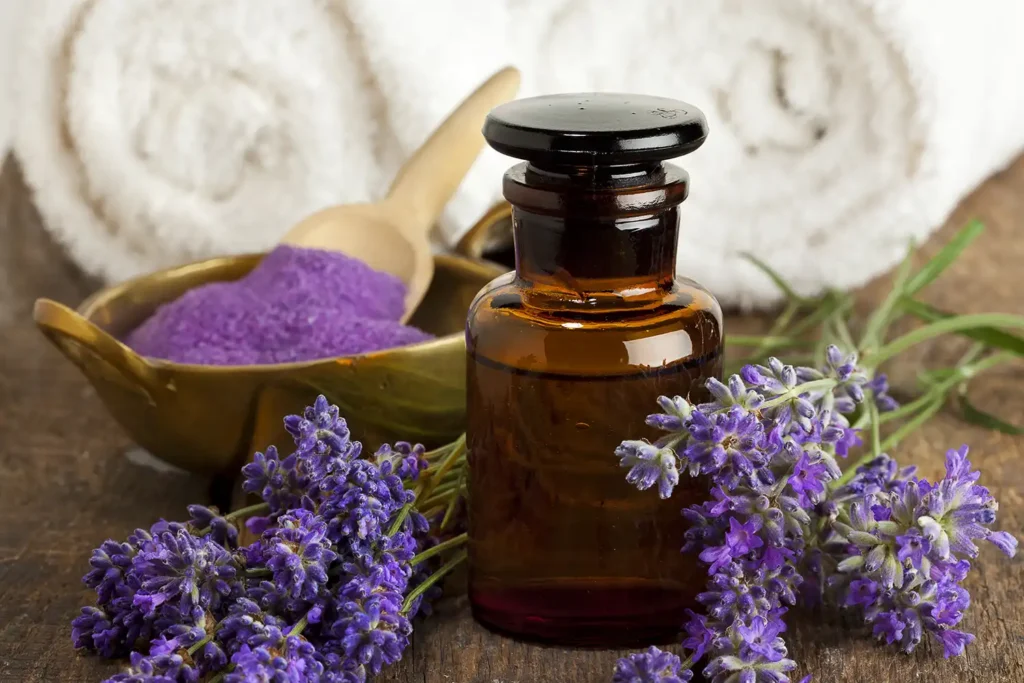
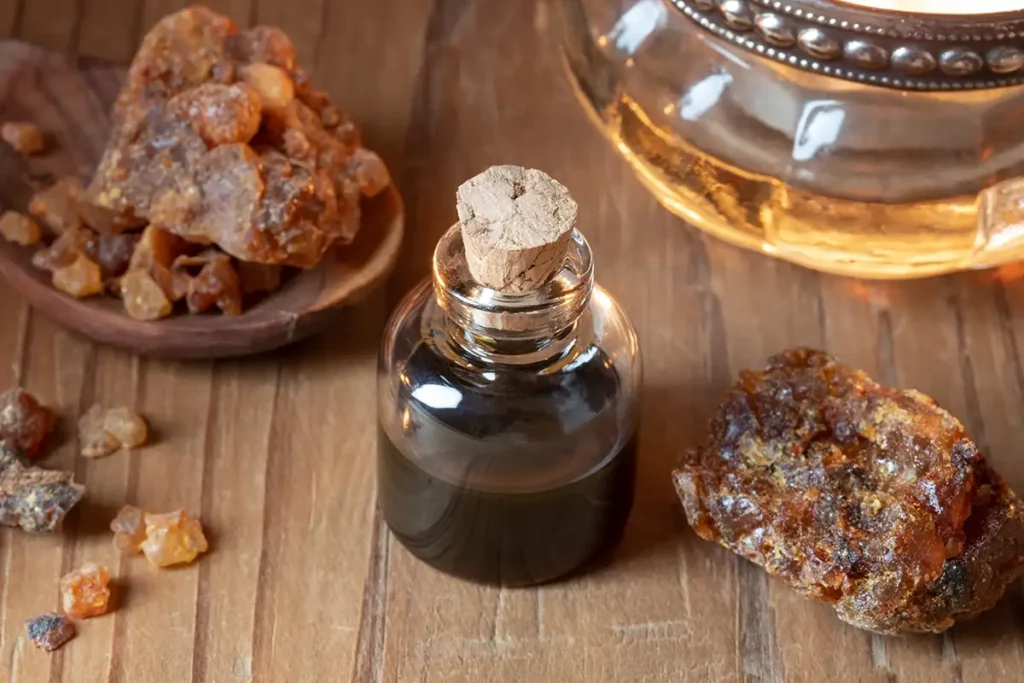
The Power of Essential Oils
Understanding how aromatherapy restores balance, let’s now explore the functioning and safe usage of essential oils.
How Essential Oils Work with our Sense of Smell
Cell receptors in the nose detect essential oil molecules. These receptors send signals to the brain’s limbic system through the olfactory nerve pathways.
The olfactory system and the brain
This system is closely tied to areas of the brain that control memory, emotion, motivation, mood, and physiological processes. When essential oil scent signals reach the brain, they can trigger immediate responses like calmness, invigoration, or nostalgia.
The physiological response to essential oils
Inhaling essential oils also causes direct changes in heart rate, hypertension, breathing, and stress hormone levels. Many oils contain compounds that interact with the body’s enzymes, hormones, and neurotransmitters to exert therapeutic effects.
Safe Use & Application of Essential Oils
Essential oils are highly concentrated and should always be diluted before applying to the skin to avoid irritation. Some can interact with medications or exacerbate health conditions, so consult your doctor before use if you have any concerns.
Here are some best practices when using aromatherapy oils:
Perform a patch test by applying diluted oil to a small skin area first.
Dilute oils with a carrier oil like jojoba, coconut or almond oil.
Use lower concentrations in high-risk groups like pregnant women. It is best to consult with a professional about making essential oils safe to use with babies and children.
Avoid contact with eyes and other mucous membranes.
Store them properly in dark bottles out of direct sunlight.
Do not ingest essential oils unless under the guidance of a fully qualified aromatherapist.
Tips for Incorporating Aromatherapy into Daily Life
Here are some simple tips for making aromatherapy a part of your daily routine:
Aromatherapy on-the-go: Inhalers and Diffuser Jewellery
Portable aromatherapy methods allow you to enjoy the benefits no matter where you are.
Inhalers are small plastic tubes filled with absorbent material and a blend of oils. You unscrew the lid and breathe in through each nostril. An essential oil works quicker in an inhaler because it is not diluted and quickly enters the body.
There are a variety of styles available for diffuser jewellery with an absorbent pad in them. Some can be attached to a keyring, whereas others are designed to be worn around the neck.
Setting Up an Aromatherapy Home Space
Create a relaxing and therapeutically effective environment at home with these tips to make your oils safe to use:
In the Kitchen
Put a few drops of Lemon essential oil down the plughole of your sink last thing at night. It will stop potential drain smells from coming up. Add a drop or two to your bathroom sink, and don’t forget your kitchen bin as well.
Choosing a Diffuser
Invest in a quality diffuser that uses cold air or ultrasonic technology. Place your diffuser in a frequently occupied bedroom, living room, or office. Many diffusers are USB-powered, which means they are safe to use, with no naked flames.
Installing a diffuser with a timer in your hallway allows you to enjoy a soothing fragrance when you return home from work.
Safety Precautions and Essential Oil Storage
Read labels carefully and keep essential oils out of reach of children and pets. We recommend essential oils are stored properly in dark amber or cobalt glass bottles in a cool, dry place.
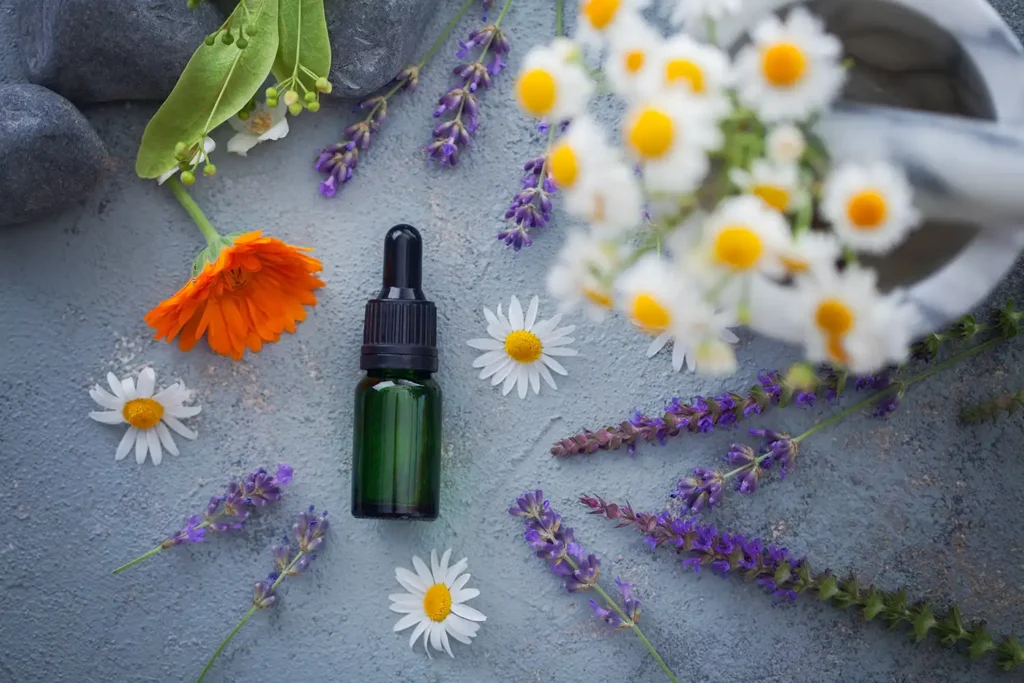
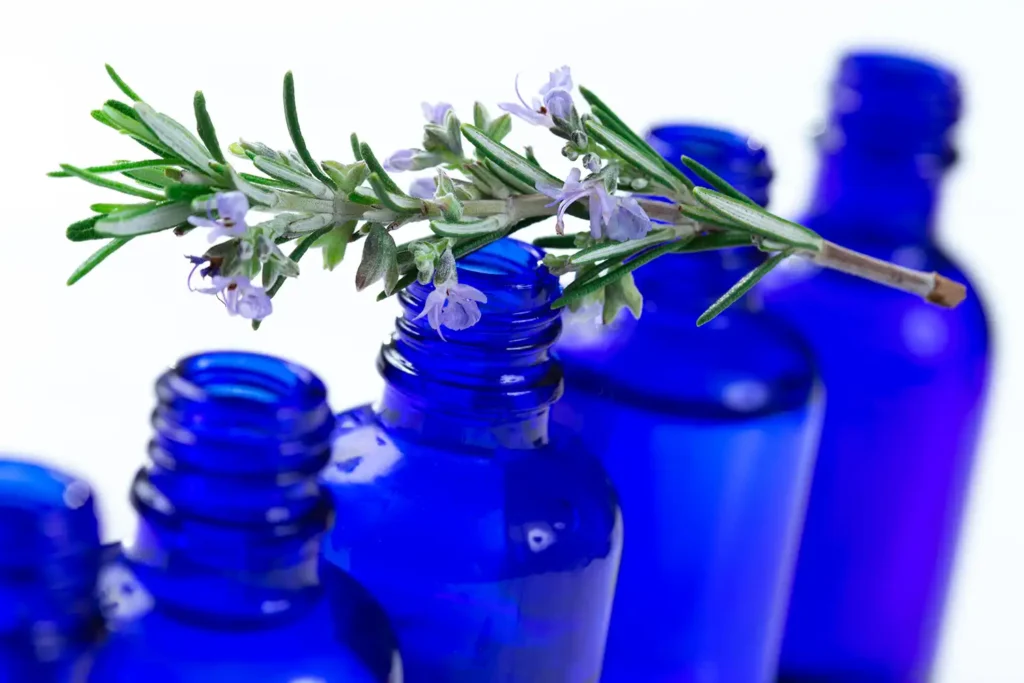
Other Stress-Busting Essential Oil Blends
After trying different oils, you will know which essential oils work best for you. It can then be an idea to try different blends. For example, Valerian may work very well for you, but you simply don’t like the smell of it. In this case, you can use blends to make the aroma more appealing and create a new essential oil blend just for you.
When using essential oils, always check for possible contraindications. For example, Clary Sage oil is excellent for managing anxiety but not safe for use during pregnancy. Just because pure essential oils are natural does not mean they should be used without thought and safety.
Use 1 drop of Clary Sage essential oil, 1 drop of Sandalwood essential oil and 1 drop of Roman Chamomile essential oil. These oils work in harmony with a slightly woody scent and calming effect.
Use 1 drop of Geranium essential oil, 1 drop of Clary Sage essential oil, 1 drop of Tea Tree oil, and 1 drop of Lemongrass essential oil. This creates a very fresh, floral blend that smells lovely in a diffuser or in aromatherapy jewellery. Add a drop of Jasmine essential oil to enhance the floral and exotic scent. Check for any contraindications before using the blend personally or diffusing it in a shared area.
Other essential oils can blend beautifully together to make a body oil. To 2 tablespoons of Coconut oil, add 1 drop of Geranium oil, 1 drop of Lavender oil, 1 drop of Sweet Basil oil and 1 drop of Clary Sage oil. This is an excellent way to apply essential oils after a shower or bath to relieve anxiety. Again, remember the safety instructions.
Several essential oils for anxiety are part of the citrus family. They reduce your anxiety symptoms and make everything seem less of an issue. Use 2 drops of Orange essential oil, 3 drops of Bergamot essential oil, 1 drop of Lemon essential oil, and 1 drop of Lemongrass oil.
Nurses in the ER who inhaled Patchouli oil reported feeling less stressed than a control group of nurses. The oil used in that study was diluted, and even diluted, it helped to reduce anxiety levels. This body oil will be lovely to use after a shower. Simply combine 2 tablespoons of Sweet Almond oil with 1 drop of Patchouli oil, 1 drop of Orange oil, 1 drop of Sweet Basil oil, and 1 drop of Lemon oil.
Key Takeaways
- Prolonged stress can negatively impact both physical and mental health. Aromatherapy provides a drug-free way to manage stress.
- Essential oils have strong plant compounds that affect the brain’s scent pathways. They can change mood, emotions, and other brain processes.
- Use a diffuser to scent your home environment or apply diluted oils topically to experience aromatherapy benefits.
Conclusion
Embracing Holistic Methods for Stress Relief
Aromatherapy offers a natural way to help cope with life’s busy pace. Scientific evidence continues to demonstrate the benefits of essential oils for balancing mood, relaxation, and overall wellness. As more people recognise the risks of prolonged stress, the use of holistic therapies like aromatherapy will likely continue growing.
The Growing World of Aromatherapy and Its Benefits
You can tap into their healing potential by incorporating essential oils into your daily self-care rituals. Use calming aromas to relax before bed, during meditation or studying, or whenever you need a break. With proper use, aromatherapy oils can be an effective piece of your stress management toolkit.


